Notes by Thalia
Lifestyle Design for Women
- Lifestyle Design
- Self-Discovery
- Productivity
- Buy me a coconut

Book Review; Mindset by Carol Dweck
February 22, 2021 · In: Tools
Last Updated on August 27, 2024 by Thalia
By the end of last year, I was exhausted from reading so many self-improvement books.
I never want reading to feel like a chore so I took a step back and filled up my cup with purely fiction.
So instead of picking up another non-fiction book, I thought I would revisit one of the first-ever self-improvement books I ever read.
Here’s everything I learnt and took away from reading Mindset by Carol Dweck.

It’s been a while since I’ve done a book review.
And the main reason for that is I’ve been making a conscious effort to read more fiction.
My reading really took a toll late last year as I was reading so many personal development books that I became exhausted.
I never want reading to feel like a chore.
I love to read.
So since the beginning of this year, I’ve been reading purely fiction to help me find that passion again.
And although those books were great, they weren’t exactly blog post material.
You’ll be happy to hear though that I have just picked up my first non-fiction book of the year;
You’re Not Listening by Kate Murphy.
So while we wait patiently for that book review, I thought I would revisit one of my favourite self-improvement books : Mindset by Carol Dweck.
Table of Contents
What is a fixed mindset, what is a growth mindset, my biggest takeaway from mindset, how to handle a fixed mindset, final thoughts, the lowdown on mindset by carol dweck.
Mindset by Carol Dweck is a fundamental book that everyone should read.
It focuses on changing the way we think to fulfil our potential.
Within the book, Dweck explores the power of our mindset and how success doesn’t just depend on our abilities or talent but rather on how we approach our goals; with a fixed or growth mindset.
But what does having a fixed or growth mindset actually mean?
Let’s break it down.
A fixed mindset is the belief that our “intelligence is static” and we cannot reach our full potential.
People with a fixed mindset try to avoid challenges. They give up easily, ignore useful feedback and feel threatened or jealous by the success of others.
Basically speaking, every time you’ve told yourself “I’m not smart enough” or “I will never succeed”, that’s your fixed mindset talking.
Having a growth mindset is the opposite of a fixed mindset.
It’s the belief that our “intelligence can be developed” therefore reaching high levels of achievement.
People with a growth mindset try new things, learn from their mistakes, embrace challenges and welcome feedback.
They strive to be better every day.

Throughout the book, Carol compares these two mindsets.
She shows us how a fixed mindset is usually the default mindset but how we can start adopting a growth mindset instead.
Carol Dweck draws upon case studies of well-known and famous people as examples to back up her points. e.g. Michael Jordan.
And this helped me to appreciate the book even more as I could relate it to people I was familiar with.
As a whole, this entire book is a takeaway.
Mindset has taught me a lot about my mindset issues and got me asking myself some very difficult and challenging questions.
During the first few chapters, I was quick to point out that I had a growth mindset.
I believe that we all have the potential to achieve our goals by learning and growing to get there.
I was never the smartest kid at school and I was never treated as though I would achieve great things. But I’ve never allowed this to get in my way.
Even Dweck says, “It’s not always the smartest people who end up the smartest.”
And this is so true. Because as I’ve gotten older I’ve spent more time honing my skills but also learning new ones. I’ve learnt from previous mistakes and failures and used them to my advantage by helping me improve. I have grown so much as a person and probably wouldn’t even recognise myself if I met 13-year-old me.
However, just because I have a growth mindset when it comes to certain things doesn’t mean that is true for all areas of my life.
I won’t get too personal here as a lot of this remains very private to me. What I will talk about though, is the way I perceive myself and the constant self-doubt I have knocking around in my head.
Like many others, I tell myself that I will never succeed. That I’m not good enough, that I will never be good enough. But this is my fixed mindset talking.
It pops up whenever I doubt myself, whenever I am challenged to do something new and during periods of anxiety. I always used to give in to it. Believe it. Let it win. But since reading Mindset , I have become more aware of why I have these feelings and how to handle them.
“It’s not always the people who start out the smartest who end up the smartest.” carol dweck | mindset
Carol Dweck tells us that instead of working against our fixed mindset, we need to instead give it a persona and embrace it.
And to do this, you must give your fixed mindset a name and befriend it.
You then need to figure out what triggers your fixed mindset so you can be ready for when it next shows up.
So this is what I’ve started to do now whenever I face moments of self-doubt, limiting beliefs or a lack of confidence.
Instead of letting my fixed mindset limit me, I’m telling it why I need to take this step and inviting it to follow me on this journey.
“Mindsets are just beliefs. They’re powerful beliefs, but they’re just something in your mind, and you can change your mind.” carol dweck | mindset
I must admit that I was slightly apprehensive about reading this book at first.
Carol is one of the world’s leading researchers in personality and social and developmental psychology so I felt that it would be highly academic and difficult to understand.
But it’s the complete opposite. Carol wanted this book to be easily digestible and easy to follow.
And that’s exactly what it is.
So if you’re going to buy any book this month make sure it’s this one by Carol Dweck, and invest in your mindset.
Until next week,
♡ Thalia xx
Let me leave you with this one last quote…
“Becoming is better than being.” Carol Dweck | Mindset
Disclaimer: Please note, this post contains affiliate links. If you make a purchase through these links then I will be rewarded at no extra cost to you. Any money earned through affiliates will be put towards running my blog and newsletter.
You’ll Also Love

December 6, 2023 at 11:34 am
This is my second time reading Carol Dweck’s book; the first time, I couldn’t go beyond the second chapter–I found the experiments and examples rather mundane. May be I was/ am biased. Reading it the second time, 4-years later, I am getting new insights that I could relate to especially after reading books and articles about creativity and innovation– whether these are innate abilities or can be taught? Having said that, I am a strong believer that learning/ creativity/ innovation are taught skills although having innate abilities does no harm. However, after reading many independent critics of Carol Dweck’s “Mindset”, my take is that a growth/ fixed mindset is something we “have” not what we “are.” Everything else is details.
December 19, 2023 at 7:49 am
So glad you gave Mindset another go! I think it is a great book to bring awareness around how mindset works (the fixed and growth aspects). Thanks for adding to the conversation and sharing your own perspective from the book!
Leave a Reply Cancel reply
Your email address will not be published. Required fields are marked *
Save my name, email, and website in this browser for the next time I comment.

How To Create a Productive Daily Routine You Love
An email worth opening..
Join 6000+ women transforming their life, one Sunday at a time

For More Daily(ish) Self-Care
Join me on Instagram → @notesbythalia

- Privacy Policy
- Terms & Conditions
Tools & Resources
- Coaching Program
- Confidence Workshop
- Free Clarity Call
- Core Values Workbook
- The Weekly Reset
- Trending Posts
Copyright © 2024 Notes by Thalia · Powered by Overwrite
Privacy Overview
Shift your mindset, reset your habits, and connect with your values so you can feel more fulfilled in your career, lifestyle and mind.
Your Information is 100% secure and will never be shared with anyone. You can unsubscribe at any time.

Mindset: The New Psychology of Success
Carol s. dweck.
276 pages, Hardcover
First published January 1, 2006
About the author

Ratings & Reviews
What do you think? Rate this book Write a Review
Friends & Following
Community reviews.

What’s wrong with them? I wondered. I always thought you coped with failure or you didn’t cope with failure. I never thought anyone loved failure. Were these alien children or were they on to something?
Look, what a smart boy/girl … You are so intelligent, excellent …
Hmm, good job, this might have been an easy puzzle, let’s do something more challenging… or Hmm, good job, you seem to have worked so hard, let’s move on to a harder puzzle.
When it’s really hard, and I try really hard, and I can do something I couldn’t do before. When I work on something for a long time and I start to figure it out. See the difference? Which set of answers resonates most with you? There was a saying in 1960 which read: “Becoming is better than being”. The fixed-mindset robs people from the luxury of becoming. They have to already be. Mindset in relationships Mindsets manifest themselves in every domain, whether you are a leader, teacher, parent, or a husband/wife. I chose relationship since I guess there are lots of myths around this topic (we all once craved to find our one true soulmate I guess), and also you must beware that even people with growth-mindset, might approach a domain like relationships with fixed-mindset. People with fixed-mindset think that if their relationship is the right one, and if they are compatible with one another, well, this means most things will fall into its place. In the face of problems, they tremble and threads of doubts and fears start to sneak in. People with fixed-mindset say if this is the right relationship and if we are compatible, there must be no need for hustle and hard work to get it to work. Remember the delusions sparked by the fixed-mindset? “If you have the ability, then you shouldn’t work hard for it”. Aaron Beck, noted marriage authority, says that one of the most destructive beliefs for a relationship is “If we need to work at it, there’s something seriously wrong with our relationship.” Says John Gottman, a foremost relationship researcher: Every marriage demands an effort to keep it on the right track; there is a constant tension . . . between the forces that hold you together and those that can tear you apart. As with personal achievement, this belief—that success should not need effort—robs people of the very thing they need to make their relationship thrive. It’s probably why so many relationships go stale—because people believe that being in love means never having to do anything taxing. How do I go from fixed-mindset to growth-mindset In this section, I share with you how you can adopt a growth mindset. Congrats, we have already taken the first step by shedding the light on these two modes of thinking. Regardless of these further steps, the sheer awareness of these two mindsets takes you a long way, but, it may not be enough. One way which is a profoundly effective way to instill the growth-mindset is studying the lives of great performers, and world-known figures like Michael Jordan, Mozart, Michelangelo, etc. Why, you might ask. The reason is that when you study the lives of such achievers, you will notice a common theme in their life story and that it, “hard work”, and not talent or IQ. While people marveled at the Pietà masterpiece, this is how the wizard, Michelangelo responded: If people knew how hard I worked to get my mastery, it wouldn't seem so wonderful at all... For practical insights refer to: Growth Mindset vs Fixed Mindset

Join the discussion
Can't find what you're looking for.

Mindset The New Psychology of Sucess Summary, Review, Notes
Dr. Carol S. Dweck, the Professor of Psychology at Stanford, demonstrates in her book “Mindset,” how a person’s perspective on their own abilities and the range of possible mindsets has a significant impact on their performance in school, work, sports, the arts, and pretty much any other area of human endeavor. Dweck explains the distinction between what she calls “fixed” and “growth” mindsets.
Dweck compares the growth mindset with the fixed mindset, and how each affects learning, relationships, and self-improvement. Additionally, she offers doable methods for developing a growth mindset and overcoming the constraints of a fixed mindset.
Book Title— Mindset. The New Psychology of Success Author— Carol Dweck Date of Reading— March 2023 Rating— 9/10
What Is Being Said in Detail
Introduction.
In response to student requests, Dr. Carol S. Dweck, wrote Mindset to disseminate the findings she and her students had made together in class, primarily that a “mindset,” rather than natural talents or abilities, determines failure or success in a given situation.
The purpose of Dweck’s book is to demonstrate how a shift in perspective can improve one’s outlook on one’s career, friendships, relationships, and pursuit of one’s goals. To achieve our goals, we need to stop thinking of ourselves as static individuals and instead adopt a growth-oriented, open-minded perspective.
CHAPTER 1. The Mindsets
Dr. Carol Dweck has spent the past thirty years studying people who have achieved great success , finding that some of them reach their full potential while others remain average.
Dweck was surprised to see that some of the kids appeared to actively enjoy the harder puzzles when she observed children in a study where they were asked to solve progressively more challenging puzzles.
The author argues that while some kids will take their setbacks as definitive evidence of their inability or incapacity, others will see them through a different lens. They view setbacks as opportunities for growth, knowing that with each setback, they will gain valuable experience and knowledge that will help them become better performers.
The second group discovers that setbacks aren’t as terrible as they may have seemed at the time. She thinks the real question is whether you think talent is something you’re born with and just have to prove, or if you think it’s something you can hone and improve upon. A “growth mindset” describes the first mentality. A “fixed mindset” describes the second way of thinking.
People with a fixed mindset believe that their level of intelligence is immutable. They are extremely preoccupied with their intelligence and the other areas in which they excel.
On the other hand, they have a hard time taking on challenges because doing so could reveal their own shortcomings or insecurities. A person with a fixed mindset lacks the motivation to take on challenges and often has difficulty dealing with uncertainty as a result.
People who adopt a growth mindset view the world in a very different light from the get-go. They have a strong motivation to learn and grow as a result of their conviction that intelligence can be nurtured.
They welcome challenges because they know they will make them stronger. They see failure as a learning experience rather than a reflection of who they are, so they consider themselves winners no matter what the outcome.
Growth and skill acquisition are viewed as being dependent on putting forth an effort. Insightful data can be gleaned from criticism and negative comments.
How you feel about the unchangeability of intelligence and personality traits, or the possibility of making major changes in both, is an indicator of your own mindset.
Dweck challenges the reader to put himself in the shoes of both mindsets, noting how those with a growth mindset are more likely to embrace challenges and see them as opportunities for development.
CHAPTER 2. Inside The Mindsets
To succeed, you must cultivate an understanding of your own identity. That’s why it’s crucial that you know what goes into your decision-making process. When you know yourself inside and out, you have a better grasp of your abilities and limitations.
The journey to knowing oneself can take many forms. The Myers-Briggs Type Indicator, the Predictive Index, and the StrengthsFinder are just a few of the personality tests available.
You can learn about your own decision-making processes by keeping a journal in which you record your predictions for the outcomes of various choices and then compare these predictions with the actual outcomes.
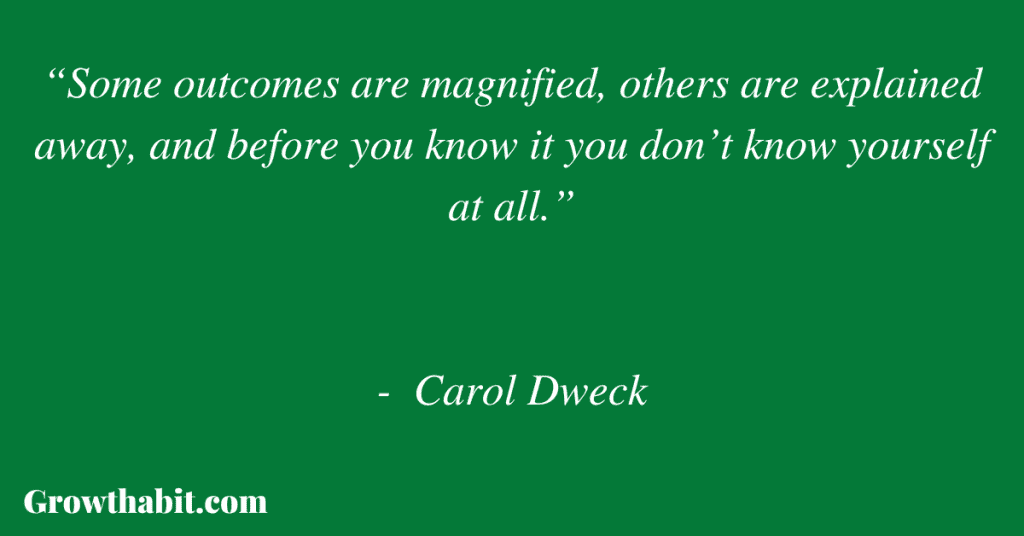
There is a distinction between these two perspectives on the importance of external validation and approval of our own success and excellence . People with fixed mindsets are constantly trying to win the approval of those around them.
To put it another way, they are seeking external validation of their abilities. Those who have a growth mindset don’t do that, not because they don’t care what other people think of their achievements, but because they don’t need other people’s approval to achieve their goals.
It is crucial that we are able to tell the difference between a growth mindset and a fixed mindset, as this can have profound effects on our outlook on the world.
CHAPTER 3. The Truth About Ability And Accomplishment
People with a fixed mindset regard effort as a waste of time and energy, whereas those with a growth mindset recognize the importance of such efforts in expanding one’s intelligence and achieving one’s goals.
Carol Dweck’s Ph.D. dissertation focused on the difference between a fixed and a growth mindset. Her experiment investigated how a person’s attitude toward their own failures affected their performance.
The theory was that when inability was perceived as the root cause of failures, people would become inhibited or lack confidence in situations where they had previously excelled. On the other hand, difficulties and challenges can motivate you to work even harder.
Dweck and her team conducted an experiment on “helpless” elementary school students to test this theory. In fact, they discovered that if the kids encountered a few math problems they couldn’t solve, they lost the ability to solve problems they had previously mastered, and for some, this loss of ability lasted for days.
The group then worked with half of the students, teaching them to blame themselves for their failures while also encouraging them to try again. These young people learned to persevere in the face of adversity and achieve their goals. The non-treatment group made no progress and continued to deteriorate quickly, recovering only slowly.
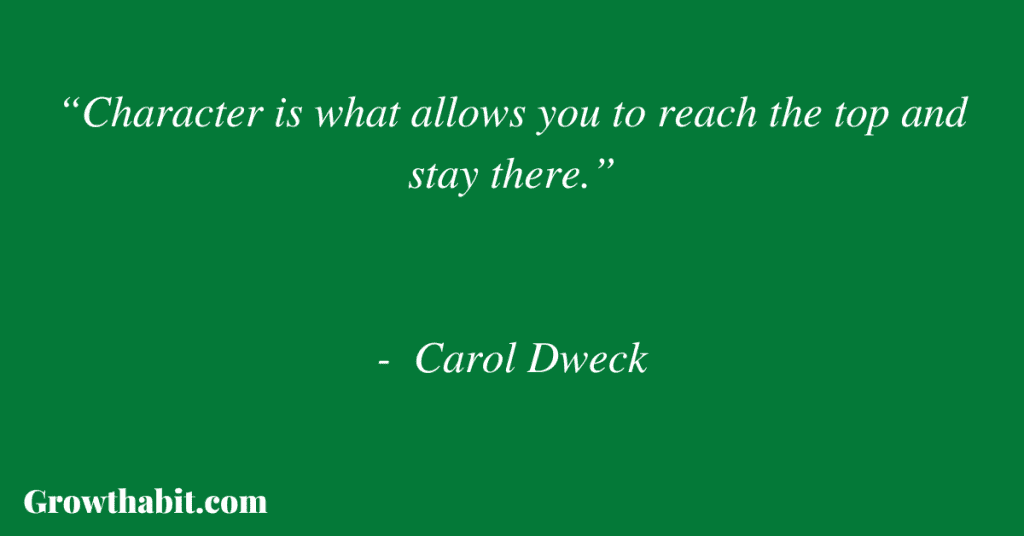
Dweck’s research found that “their goals” distinguished students who persevered in the face of adversity from those who gave up. Progress toward “learning goals” or “performance goals” can be influenced in a variety of ways.
Dweck also addresses the issues that contribute to individual differences in how much emphasis is placed on various goals. She concludes that people with a growth mindset perceive ‘ability’ differently than people with a fixed mindset.
If you have a fixed mindset, you expect a certain level of performance from yourself and believe that your natural talent is fixed. When you adopt a growth mindset, you believe that intelligence can be developed and that the challenges that come with learning are exciting.
There are things you can do to improve if you have a fixed mindset and realized it while reading this summary. Dweck advises us to think about our heroes and the qualities that make them so admirable.
Do the people you admire appear to have risen to prominence with little effort on their part? If this is the case, inquire about the effort that led to their success. Make sure you’re pushing yourself by setting lofty goals. Then, make a promise to yourself that no failures or difficulties will deter you from your quest.
Failures and defeats can be highly instructive if we take the time to reflect on what went wrong and apply what we’ve learned to future attempts at the same challenge. Failure and defeat have the potential to motivate us, and they frequently do. When we’ve worked hard to get there because of that inspiration, success tastes much better and is more rewarding.
CHAPTER 4. Sports: The Mindset of a Champion
Many people believe that natural talent alone is sufficient to reach the pinnacle of any field of endeavor, including sports. This false belief, however, is typical of people with fixed mindsets.
The evidence for the success that can be achieved through effort and training is all around us, and this is consistent with the belief that a growth mentality can be developed.
A gifted athlete risks being stymied by his or her own abilities. The main reason for this is that gifted people tend to overvalue their natural abilities while undervaluing the value of consistent, hard work.
The distinctions between fixed and development mindsets are most visible in how they interpret an individual’s behavior.
Athletes who are widely regarded as “naturals,” such as Michael Jordan, Babe Ruth, and Jackie Joyner-Kersee, required countless hours of hard work to achieve their peak levels of performance.
In comparison, Boston Red Sox pitcher Pedro Martínez succumbed to the fixed mindset. Because he was constantly praised, he began to believe that any shortcomings were the result of outside influences. When the Red Sox began losing to the New York Yankees in October 2001, Martínez went on a rant, attacking his own coach and threatening players.
His inability to overcome adversity resulted in a disastrous outcome, and the Yankees went on to win the game.

The conceptual distinction between fixed and development mindsets is again at work here, and this is where a person’s personality really shines through.
While those with a fixed mindset place undue emphasis on natural ability, those with a development mindset recognize that talent is only partially utilized before it reaches its full potential in the absence of practice.
When you have a champion’s mentality, you understand that everyone around you is important, regardless of the sport you play.
CHAPTER 5. Business: Mindset And Leadership
Carol Dweck’s research has expanded to include an examination of company-wide mindsets. Dweck and her new research team polled employees from seven large organizations to determine their level of agreement with phrases intended to indicate whether their workplace fostered a fixed or development mentality.
The authors of the study wanted to know if managers with a growth or fixed mindset had a more positive or negative impression of their employees, as well as if employees were more satisfied with their jobs, coworkers, and opportunities for innovation, ethics, and collaboration.
Employees of both growth-oriented and fixed-orientation businesses expressed a similar level of agreement when polled. Employees with a fixed attitude in a company were more likely to report that only a few “star” employees received preferential treatment.
They had less faith in the company and were less committed to their jobs than those who worked for companies with a growth mindset. Because they were afraid of failing, they tried fewer new things and were more likely to lie, steal, and take shortcuts.
Employees who have a “growth mindset” are more likely to have the following favorable attitudes toward their employer:
- 47% believe their coworkers are trustworthy;
- 34% believe they are loyal and committed to the company;
- 5% believe they are encouraged to take risks; and
- 49% believe the company supports innovation.
Companies can foster a growth mindset by providing opportunities for professional development (such as paid training and educational grants), encouraging employees to look internally for new hires, and offering financial incentives for creative problem-solving.
CHAPTER 6. Relationships: Mindsets In Love (Or Not)
It’s no surprise that a fixed mindset can destroy even the strongest friendships and partnerships. A “stuck perspective assures relationship suffering, and even disaster,” says relationship expert Rinatta Paries.
This is especially troubling because she believes that the majority of men and women have a fixed worldview when it comes to romantic relationships.
The majority of singles agree that finding the right partner is critical to having a successful romantic relationship. Many people believe that once they’ve found “the one,” their relationship will run smoothly and provide a solid foundation for the rest of their lives.
Furthermore, they frequently believe that the “correct” partner will accept them exactly as they are, and that this is a necessary condition for happiness in a relationship. While it is natural and healthy to want to be liked and accepted, focusing solely on that goal can be detrimental to interpersonal relationships.
According to Paries, a relationship is doomed when one person remains static while the other strives for growth. Breakups happen when one partner in a relationship wants to change and the other partner is opposed.
Another result of the fixed mindset is the belief that our partners should be telepathic. This leads to misunderstandings and unfair blame attributions to our partners’ personalities. Friendships are harmed when people with fixed ideas foster unhealthy rivalries.
If you have a growth mindset, choose a companion who thinks and acts similarly to you. If you don’t, you’ll be pleading with someone who doesn’t believe they can or will be able to make the necessary changes to your request.
If you’re stuck in your ways and need a gentle reminder that long-term relationships require give and take on both sides, consider this: if you want a long-term partner, you’ll need to learn to accept change.
CHAPTER 7. Parents, Teachers, and Coaches: Where Do Mindsets Come From?
While it’s natural for parents to want to lift their children’s spirits, it’s important to remember that praise can be used in both directions.
Children should not be praised for their “innate talent,” as this promotes a preconceived worldview. High-achieving students are taught to avoid making mistakes in order to avoid being chastised for their efforts.
Instead of focusing on a child’s fixed abilities, it’s important to recognize and reward their efforts and outcomes in order to foster a growth mindset. Rather than praising a child for intangible characteristics, this reinforces the child’s efforts and provides specific feedback.
When her children complete a task quickly and correctly, Dweck says, “I guess that was too simple… “Come on, let’s do something instructive!” By being exposed to adversity in this manner, children learn to see it as an opportunity.
Parents who put too much pressure on their children to succeed risk having their love interpreted as conditional.
Educators are no exception. It’s a self-fulfilling prophecy that teachers who label their students as achievers or non-achievers will see those labels reflected in their students’ performance throughout the year.
CHAPTER 8. Changing Mindsets: A Workshop
According to Dweck’s research, it is possible to shift from a limiting “fixed” mindset to a more adaptive “growth” mindset. The first step is to become acquainted with oneself. First and foremost, stop trying to avoid difficulty and start dealing with it.
To tune into the new perspective, start responding to your fixed mindset voice (FM) as if you already had a growth mindset (GM). Examples include:
FM: “You can’t do this, You’re just not talented enough.”
GM: “I believe I can master this with practice,”
Fm: “What if you fail? You will fail if you attempt to do so”
GM: “Most successful people fail along the way,”
FM: “If you had the talent, this would be easy.”
GM: “That is not correct, every day, elite athletes put in countless hours of practice to hone their skills.”
Whichever voice you give the most weight to, will shape your decisions and the way you think in the long run. It is critical to train yourself to recognize both perspectives while responding with a growth mindset.
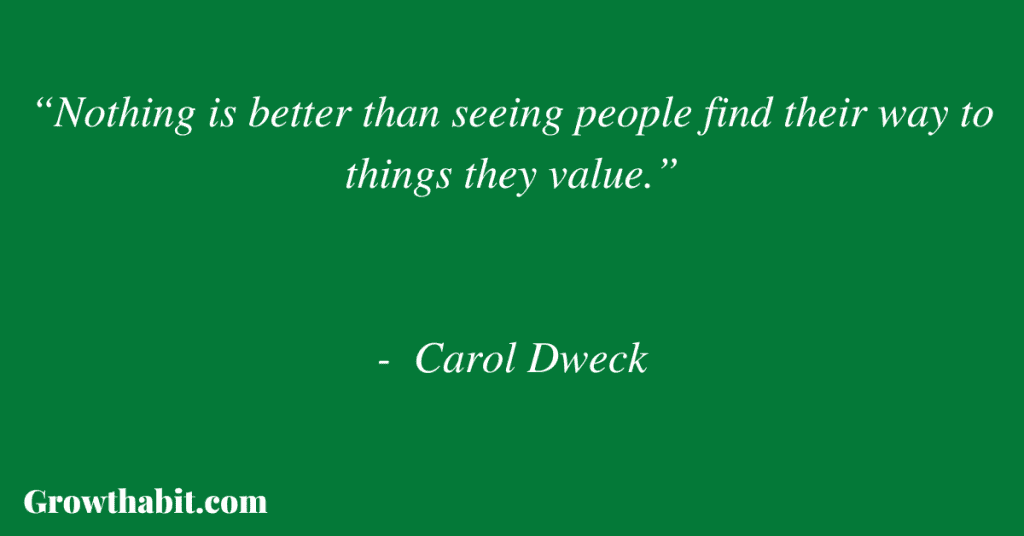
Every day offers opportunities for growth and development. We must devise strategies for capitalizing on these opportunities, and if those strategies fail, we must devise new ones. If we are successful, we must consider how to continue expanding.
Most Important Keywords, Sentences, Quotes
“The passion for stretching yourself and sticking to it, even (or especially) when it’s not going well, is the hallmark of the growth mindset. This is the mindset that allows people to thrive during some of the most challenging times in their lives.”
“Some outcomes are magnified, others are explained away, and before you know it you don’t know yourself at all.”
“The fixed mindset makes you concerned with how you’ll be judged; the growth mindset makes you concerned with improving.”
“Mindsets are just beliefs. They’re powerful beliefs, but they’re just something in your mind, and you can change your mind.”
“Smart people should always succeed. But for children with the growth mindset, success is about stretching themselves. It’s about becoming smarter.”
“Those who have a growth mindset agree that: “You can always substantially change how intelligent you are”.”
“There are many myths about ability and achievement, especially about the lone, brilliant person suddenly producing amazing things.”
“For students with the growth mindset, it doesn’t make sense to stop trying.”
“Because they think in terms of learning, people with the growth mindset are clued in to all the different ways to create learning.”
CHAPTER 4. Sports: The Mindset of a Champion
“The naturals, carried away with their superiority, don’t learn how to work hard or how to cope with setbacks.”
“Character is what allows you to reach the top and stay there.”
“Character, heart, the mind of a champion. It’s what makes great athletes and it’s what comes from the growth mindset with its focus on self-development, self-motivation, and responsibility.”
CHAPTER 5: Business: Mindset And Leadership
“Obviously, a company that cannot self-correct cannot thrive.”
“Fixed-mindset leaders, like fixed-mindset people in general, live in a world where some people are superior and some are inferior.”
“When you enter the world of the growth-mindset leaders, everything changes. It brightens, it expands, it fills with energy, with possibility.”
“It had to be a person with the fixed mindset who coined the phrase “Revenge is sweet”—the idea that with revenge comes your redemption— because people with the growth mindset have little taste for it.”
“The growth mindset says all of these things can be developed. All—you, your partner, and the relationship—are capable of growth and change.”
“In fact, every word and action sends a message. It tells children—or students, or athletes—how to think about themselves.”
“Praising children’s intelligence harms their motivation and it harms their performance.”
“When parents help their children construct growth-minded ideals, they are giving them something they can strive for.”
“Nothing is better than seeing people find their way to things they value.”
“Even when you change, the old beliefs aren’t just removed like a worn-out hip or knee and replaced with better ones. Instead, the new beliefs take their place alongside the old ones, and as they become stronger, they give you a different way to think, feel, and act.”
Book Review (Personal Opinion):
Carol S. Dweck’s book Mindset: The New Psychology of Success is about human thoughts and how they can influence how we live our daily lives. Written in the style of a self-help guide, this book is packed with useful tips and insights for improving your life.
Dweck did a ton of research and preparation for this book, which is fascinating and admirable in and of itself. The author’s “mindset” of how people’s unique perspectives and experiences lead them to live their lives in such different ways is based on extensive research spanning many years.
According to the author’s observations, there are two completely different ways of thinking; however, she found that there is a way for people with these two perspectives to communicate with one another.
Dweck provides concrete examples of how our choice of mindset determines our trajectories in life by combining her own research with that of prominent psychologists, educators, and researchers.
Although she concedes that many factors, such as gender, race, and socioeconomic background, are beyond our control, she maintains that these do not have to determine our destinies.
At the end of each chapter, the author includes a “Grow Your Mindset” section titled “Examine Your Beliefs and Actions in This Area” in which the reader is prompted to do some mental exercises to adopt a growth mindset and evaluate their own beliefs and actions.
Mindset: The New Psychology Today is a book that will expand your horizons with its insightful and thought-provoking content. There is never a dull moment in the book itself. Instead, it will take the reader on a journey that will provide him with new and valuable information that will help him live a better life.
Rating : 9/10
This Book Is For:
- People who are seeking personal growth and development
- People who want to improve their mindset and achieve greater success in life.
- People who want to cultivate a growth mindset to achieve your full potential
If You Want to Learn More
Here is an interview with author Carol Dweck about her research into “self-conceptions (or mindsets) people use to structure the self and guide their behavior”, and how you can apply a Growth Mindset at home, at school, and in your career. The Growth Mindset | Carol Dweck | Talks at Google.
How I’ve Implemented The Ideas From The Book
I procrastinated and felt burdened by deadlines. After reading Carol Dweck’s “Mindset,” my perspective shifted.
I realized I needed to adopt a growth mindset and believe that hard work and practice would improve my productivity and time management. I defined job objectives and broke them down into smaller, more manageable chunks. I also set aside daily time for these chores and held myself accountable.
Failures provided me with valuable learning opportunities. I used missed deadlines and low productivity as feedback to improve my time management and productivity. I assessed my strengths and weaknesses and sought resources and assistance to help me improve.
I overcame procrastination and became more productive and efficient by adopting a growth mindset, setting goals, and viewing failures as learning opportunities. I was able to achieve my objectives through concentration and determination.
One Small Actionable Step You Can Do
Start paying attention to your self-talk as a first step toward developing a growth mindset. Take note of how you speak to yourself when faced with difficulties or setbacks.
If you notice you have a fixed mindset, try rephrasing your self-talk to be more positive and growth-oriented. Instead of telling yourself, “I’m just not good at this,” you could say, “I may not be good at this yet, but I can improve with practice and hard work.”
You can begin to shift your mindset toward growth by changing the way you talk to yourself. This can lead to increased confidence, resilience, and willingness to take on new challenges over time.
Remember that adopting a growth mindset is a process, and changing old habits and beliefs takes time and effort. However, by taking small steps, such as paying attention to your self-talk, you can begin to move toward a more positive and growth-oriented mindset.
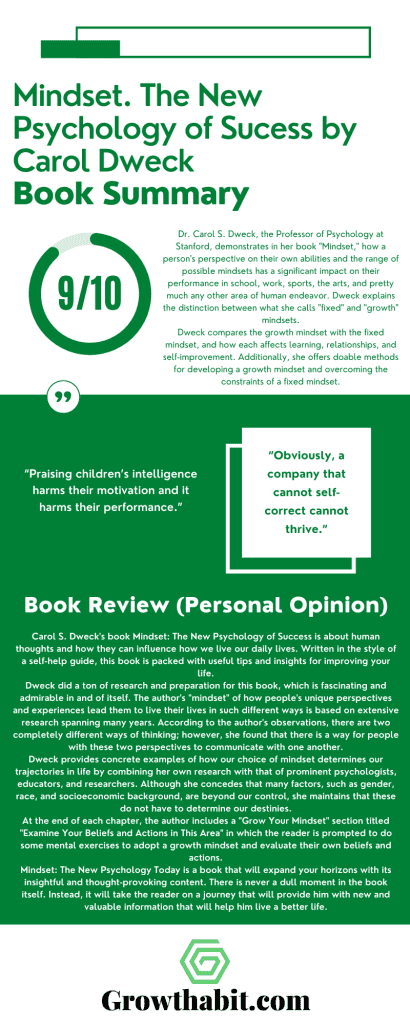

Accelerate climate innovation
Provide quality education
Cure Alzheimer’s
Origin story
My memoir Source Code is almost here
You can pre-order my new book now.
Your browser doesn't support HTML video.
My philanthropy
Tech thinking
Family and friends
Games I love
My podcasts
All book reviews
Science fiction
Movies and TV
Reading lists
Books I wrote
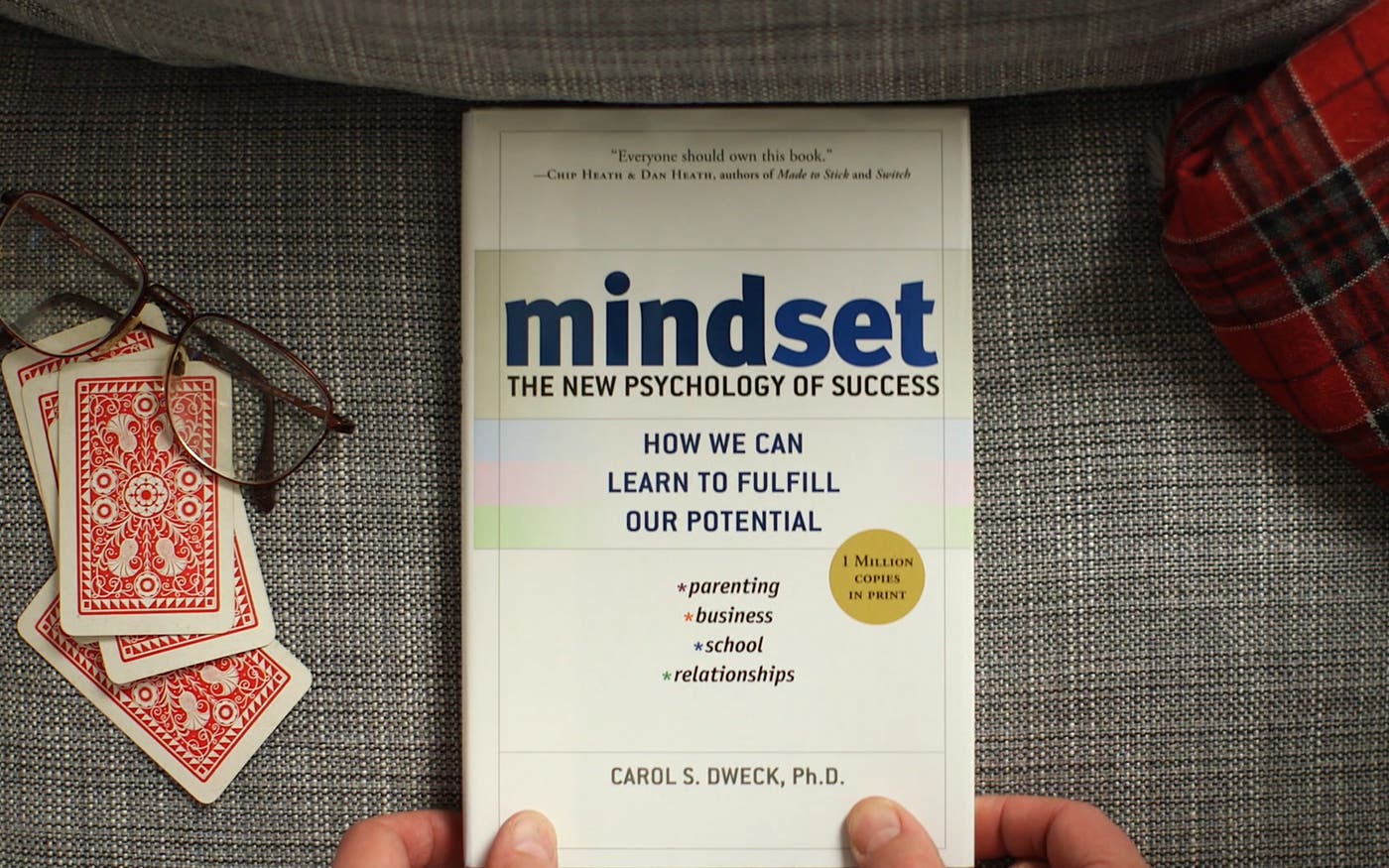
Mindset Over Matter
What you believe affects what you achieve
Revisiting Carol Dweck’s fascinating work on the growth mindset.

Even as my glasses have gotten smaller and hopefully cooler over the years, I am still a proud member of Nerd Nation. As such, I read a lot of books—usually more than 50 a year. Many of the books I review on Gates Notes are recent releases, because I figure people are generally more interested in hearing about newer works. But I also like to revisit older books that feel especially important or relevant. Mindset: The New Psychology of Success (2006), by the Stanford psychologist Dr. Carol Dweck, is one of those books.
Mindset first came to my attention a few years ago in a fascinating invention session on education with my friend Nathan Myhrvold, similar to the sessions Malcolm Gladwell described in his article “ In the Air: Who says big ideas are rare? ” Dweck’s research had a big impact on our thinking that day. And in the years since, Dweck and her research have helped my foundation colleagues and me understand more about the attitudes and habits that allow some students to persevere in school despite big challenges.
Here is Dweck’s thesis: Our genes influence our intelligence and talents, but these qualities are not fixed at birth. If you mistakenly believe that your capabilities derive from DNA and destiny, rather than practice and perseverance, then you operate with what Dweck calls a “fixed mindset” rather than a “growth mindset.” Our parents and teachers exert a big influence on which mindset we adopt—and that mindset, in turn, has a profound impact on how we learn and which paths we take in life.
In experiment after experiment, Dweck has shown that the fixed mindset is a huge psychological roadblock—regardless of whether you feel you were blessed with talent or not. If you have the fixed mindset and believe you were blessed with raw talent, you tend to spend a lot of time trying to validate your “gift” rather than cultivating it. To protect your self-identity as someone who’s super smart or gifted, you often steer clear of tough challenges that might jeopardize that identity. Here’s how Dweck puts it: “From the point of view of the fixed mindset, effort is only for people with deficiencies…. If you’re considered a genius, a talent, or a natural—then you have a lot to lose. Effort can reduce you.”
If you have the fixed mindset and believe you lost the genetic lottery, you also have little incentive to work hard. Why bother putting in a lot of effort to learn a difficult concept if you’ve convinced yourself that you’re lousy at it and nothing is going to alter that basic equation? When I was visiting with community college students in Arizona, one young man said to me, “I’m one of the people who’s not good at math.” It kills me when I hear that kind of thing. I think about how different things might have been if he had been told consistently “you’re very capable of learning this stuff.”
In contrast, people with the growth mindset believe that basic qualities, including intelligence, can be strengthened like muscles. It’s not that they believe that anyone can become the next Albert Einstein or Michael Jordan if they just work hard enough on their physics homework or fadeaway jumpers. Instead, in Dweck’s words “they believe a person’s true potential is unknown (and unknowable); that it’s impossible to foresee what can be accomplished with years of passion, toil, and training.” As a result, they have every incentive to take on tough challenges and seek out opportunities to improve.
One of the reasons I loved Mindset is because it’s solutions-oriented. In the book’s final chapter, Dweck describes the workshop she and her colleagues have developed to shift students from a fixed to a growth mindset. These workshops demonstrate that “just learning about the growth mindset can cause a big shift in the way people think about themselves and their lives.”
My only criticism of the book is that Dweck slightly oversimplifies for her general audience. Contrary to the impression that Dweck creates here (but probably not in her academic papers), most of us are not purely fixed-mindset people or growth-mindset people. We’re both. When I was reading the book, I realized that I have approached some things with a growth mindset (like bridge) while other things in a fixed mindset (like basketball).
The greatest virtue of the book is that you can’t help but ask yourself things like, “Which areas have I always looked at through a fixed-mindset lens?” and “In what ways am I sending the wrong message to my children about mindset and effort?” Thanks to Dweck’s skillful coaching, you’re almost guaranteed to approach these tough questions with a growth mindset.
/Mindset-The-New-Psychology-of-Success

Mindset By Carol Dweck: Book Summary/Review
21 February 2021
Did you know that students with a growth mindset are more than 2x more likely to score in the top 20%?
According to research done on 10th graders, students who tested positive for the growth mindset were much more likely to achieve high scores.
Students with the fixed mindset, however, were almost 3x more likely to score in the bottom 20%.
In this review I will give you:
- Overall review of Mindset by Carol Dweck and whether YOU should read it.
- Chapter-by-chapter summaries and actionable takeaways
- Actionable steps that you can take right now to improve your mindset.
Disclaimer: This post contains amazon affiliate links for the book Mindset by Carol Dweck . All purchases will go to supporting Chris Dismissed, thank you!
Table of Contents
Overall review of mindset, chapter summaries, actionable steps.
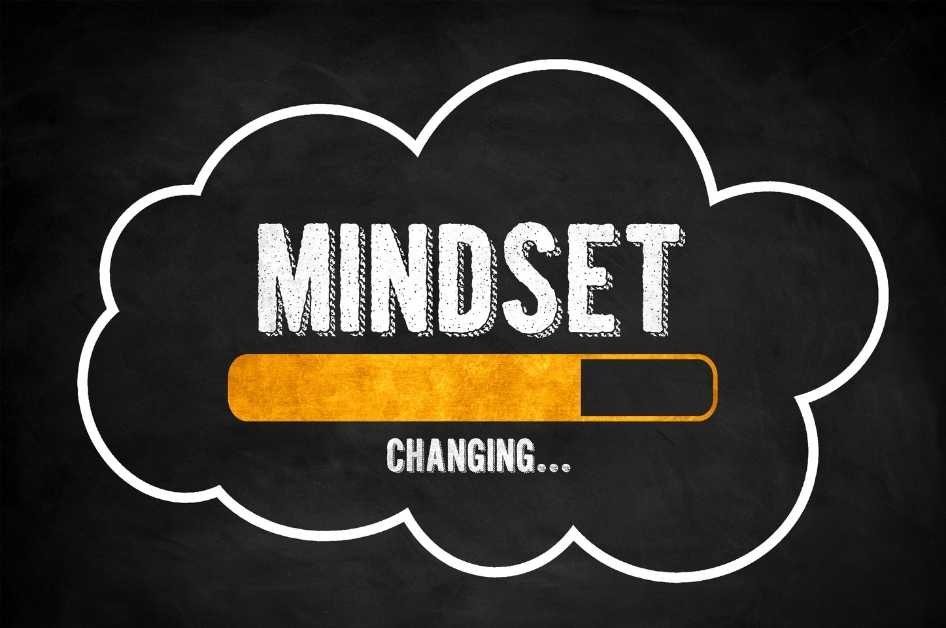
Mindset Definitions
Before we dig into Mindset and the contrasting elements of the two main mindsets, we need to define the differences between them.
What is a Fixed Mindset?
The fixed mindset is a psychological perspective that views people, objects, and qualities as fixed, immovable, and unchangeable.
What is a Growth Mindset?
The growth mindset is a state of being that assumes that all qualities, people, and natures are malleable, changeable, and capable of growth.
Those with growth mindsets do not simply focus on achievements (although they are important metrics) but are focused on growth in any given situation.
Should You Read Mindset By Carol Dweck?
Chris Dismissed Rating: 8.5/10
Overview: Solid book on the impact that a fixed and growth mindset can have on learning, success, and quality of life. This book is very focused on mindset and stays true to its title. Read Mindset if you want to change your mental approach to life.
Who Should Read Mindset?
Any hungry student, professional, or other person looking to grow in the understanding of themselves and people around them should read Mindset . This book is fundamental knowledge for anyone studying psychology, personal development, meta-learning, or entrepreneurship.
- Lots of original research.
- Stay focused on the core subject of the book: Mindsets.
- Gives great definitions for the mindsets and backs those claims up substantially.
- Provides excellent examples that anyone can relate to.
- Clear evidence makes the book very easy to understand.
Who Should NOT Read Mindset?
Anyone convinced that people are unchangeable and that talent is born should skip out on reading Mindset . The research in this book will likely conflict with your worldview and provide little benefit.
- Not a short read.
- More research is needed in this field to understand mindset benefits truly.
Top 3 Points From Mindset
1. There are two primary mindsets, the fixed mindset, and the growth mindset.
2. Mindsets are key to how we view the world and how we behave in our day-to-day lives. Mindsets are also key to happiness.
3. By adopting a growth mindset in all areas of your life you can approach change in a healthy way and continue to grow.
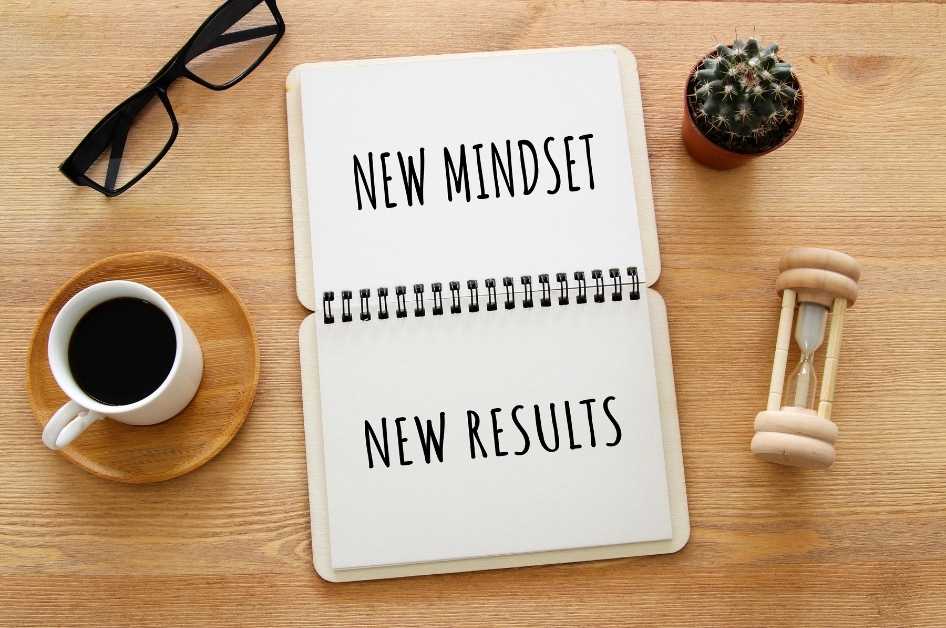
Chapter 1: The Mindsets
Carol Dweck begins her book by investigating what a mindset is in the first place.
Contrary to popular belief, Alfred Binet’s IQ test was built to monitor people’s growth and development, not their static intelligence.
Mindset is actually central to personality. Most people think that their personalities are set in stone, but personality is something that can be learned and develop.
There are two primary mindsets: the fixed mindset and the growth mindset. Here are some characteristics of each of them…
Fixed Mindset:
- Character traits are set in stone.
- I am who I am and that’s that. I can’t change.
- People’s IQ is fully descriptive and tells their full story.
- One thing defines me (my money, my grades, my relationship status) and that stays the same.
Growth Mindset:
- Everyone can change and grow at any time.
- I am who I am, but I can be more than I am right now.
- People’s IQ scores are a measurement but are not indicative of a person’s true value.
- I get to define who I am!
Most of the time we have no idea how much we are truly capable of. One key to unlocking this is reorienting your mindset.
People with a growth mindset think about action. They think about how they can improve themselves and confront challenges boldly.
Remember, just because you can’t do it right now doesn’t mean that you can’t grow into doing it.
Chapter 1 Key Takeaways:
- There is a large difference between a fixed and growth mindset.
- IQ and other intelligence indicators (grades, financials, followers, etc.) are important metrics but do not tell the full story.
- You can change your mindset right now.
Analysis and Application:
For this chapter, start by answering the following questions.
- Is my intelligence unchanging?
- Can I learn new things and change my intelligence?
- Can I always change it?
- Can I substantially change myself?
Related: So Good They Can’t Ignore You: Book Review

Chapter 2: Inside the Mindsets
Changing your mindset can change who you are fundamentally.
Perception is an active part of your psychology and of your life as a whole.
As Charles R. Swindoll eloquently stated in The Grace Awakening , “I am convinced that life is 10% what happens to me and 90% how I react to it.”
Do you think that success is about learning, or proving that you’re smarter than those around you?
In a study done by professors at the Hong Kong University , students who tested positive for the growth mindset leaped at the chance to learn and stretch beyond what is currently possible.
People with a fixed mindset thrive on doing well right away. They focus on the sure thing and the harder something is the worse they feel.
Furthermore, changing perspectives on potential is central to growth. Those with fixed mindsets often try to prove they’re “special”, “different”, “superior”, and “entitled”.
If you want to develop a growth mindset, humble yourself. Special should never mean BETTER than others. It does not mean that you are above anyone else.
Another great indicator of mindset is the way that a person deals with failure or failing grades.
Those who believe that failure is necessary and critical to growth are more likely to grow from their failures and mature from them.
People that believe that success is a zero-sum game , (that one person’s success will cause another person’s failure) will always be limited by their mindset.
Chapter 2 Key Takeaways:
- Your mindset dictates your life perception and happiness.
- Failure is necessary for growth.
- People with fixed mindsets often feel inferior or superior to others.
Analysis and Application
In chapter 2, Dweck digs deeper into the mystery of mindsets.
If you want to uncover your current mindset and what you can do to improve it, ask yourself the following questions:
- Does my success mean someone else’s failure?
- Would I rather take a big risk and fail or play the safe road but risk regret?
- Am I living my life in social comparison to those around me?
In order to change your mindset, you need to analyze your current mindset. Record your answers to these questions in a document.
Related: How to Set Goals (Step-by-Step Guide)
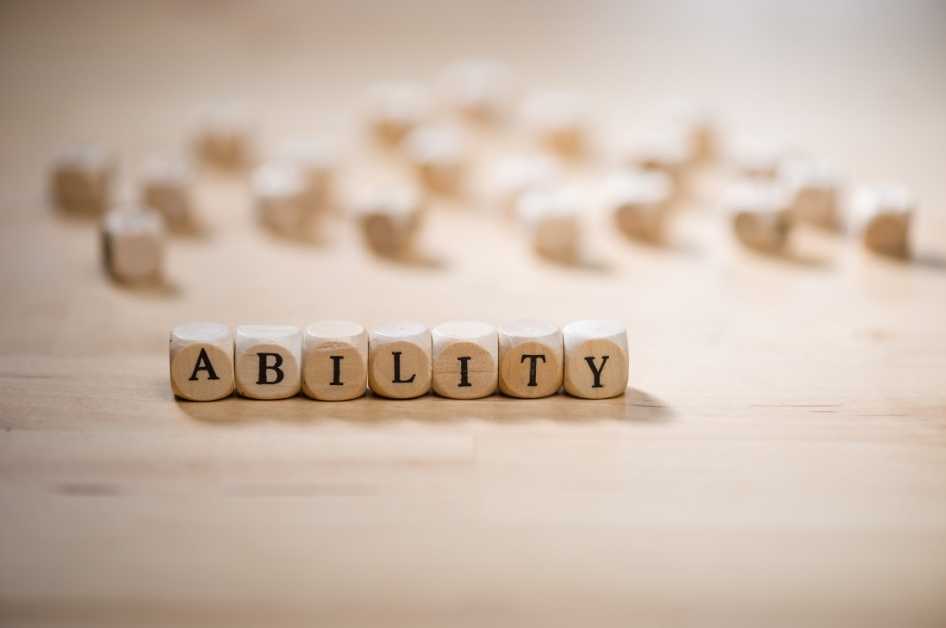
Chapter 3: The Truth About Ability and Accomplishment
While it may be true that every person has unique strengths and abilities, your potential is largely reliant on your mindset.
Mindset , and the actions that you take due to a certain mindset, are key to understanding genius and accomplishments.
Thomas Edison, Charles Darwin, and Wolfgang Amadeus Mozart were not born as historically influential figures. Their work took decades before showing fruit.
In fact, Mozart was impoverished in his own lifetime!
People with a fixed mindset blame their failure on themselves and others instead of taking their lives into their own hands.
In addition, they believe that the goal of life is to put in as little effort as possible and still have the highest result.
Carol Dweck centers her research on the beliefs that students have about their abilities and potential.
One of her most groundbreaking findings is that positive praise can be potentially dangerous.
Statements about a person’s abilities (especially during developmental years) can prime a person for the fixed mindset or the growth mindset.
Dweck reminds us to praise people for their effort and their growth instead of their talent.
Studies in Mindset research showed that praising ability lowered IQ while praising effort eventually raised it.
However, modern education systems have threatened this growth by labeling some classes as “gifted” and others as simply “normal”. This separation has led to the deterioration in childhood growth.
On the other hand, all negative labels and stereotypes are bad. But a person with a growth mindset will take the sharpness out of negative labels.
Shifting your perspective on ability and accomplishment is a key element of developing the growth mindset and raising your potential.
Chapter 3 Key Takeaways:
- Abilities and accomplishments are achieved through work and growth.
- Even the most revered people in history needed to grow.
- Positive labels can be dangerous but negative ones do not need to be harmful.
It’s time to audit your mindset. Which of the following statements do you agree with and why?
- It’s better to work little and to achieve a lot than to grow and learn from mistakes.
- I would rather be praised for my accomplishments than my efforts.
- I care and trust what people think, even if I wouldn’t take life advice from those people.
- Success is something that should come easy to me if I’m gifted.
If you agree with any of these statements there’s a chance that some elements of your life currently exhibit the fixed mindset.
Related: How to Build Atomic Habits As A College Student (11 Crucial Tips)

Chapter 4: Sports-The Mindset of a Champion
Sports and athletics is an area where the fixed mindset runs rampant.
Nevertheless, the greatest sports legends are those that had the mindset of a champion: the growth mindset.
Many people believe that natural athleticism is the only factor in sports performance. There is a resounding notion that natural ability trumps all.
And yet, some of the greatest champions (Ali, Michael Jordan, and Babe Ruth to name a few), all agreed that their greatness came from growth.
Naturals shouldn’t need effort, right?
Ability can help you get to the top of your game but character and mindset are what keeps you there.
As Rocky said: It’s not about how hard you can hit, it’s about how hard you can get hit and keep going.
Chapter 4 Key Takeaways:
- Natural talent is relevant in sports but is not the most crucial factor of success.
- Born athletes become winners, growing athletes become champions.
- Train hard in everything you do, measure progress on growth not achievement.
Developing the mindset of a champion isn’t easy. But asking yourself key questions can help you understand whether or not you have the mindset of a champion:
- Do I believe that all talents are naturally acquired?
- What does it mean to be successful?

Chapter 5: Business-Mindset and Leadership
Perhaps the most recognized aspect of life that utilizes the word “mindset” is business.
Unlike online business mentors and gurus, Dweck isn’t trying to sell you on why you should buy her course. Instead, she unravels the mystery of business mindsets in this chapter.
Businesses that grow are those that build to improve. Executives that highlight their star qualities instead of building on growth undoubtedly crumble.
Bad leaders will put down those around them and lead their company to a negative work environment.
In Mindset , several of these fixed leaders are analyzed including Lee Iacocca, Albert Dunlap, Kenneth Lay, and Jeffrey Skilling.
These executives viewed themselves as invulnerable, invincible, and entitled. Their pride crushed both them and their employees.
In contrast, growth mindset leaders (Jake Welsh, Lou Gerstner, Anne Mulcahy), put their time and energy into the nitty-gritty of the business.
Growth mindset leaders constantly erased the hierarchy between executive and employee. They seek to discover, learn, optimize and grow.
These business leaders promote teamwork to get the job done and dedicate themselves to the lives of their employees.
Dweck makes a clear statement that leaders, managers, and negotiators are not born, they’re developed through work, perseverance, and growth.
Chapter 5 Key Takeaways:
- Business success isn’t born, it’s made.
- Executives with a growth mindset focus on their employees, not their own success.
- Teamwork and leading groups through the growth mindset are crucial for long-term success.
If you’re interested in business, you know how crucial it is to develop growth in a company. Whether it’s growth in profits, assets, or impact, business growth starts with the growth mindset.
Here are some pivotal questions you can ask yourself to develop the growth mindset:
- Is business success inherent or does it come from growth?
- Am I pursuing business to be the head of a company and gain fame and fortune or to grow with those around me?
Related: 10 Best Books I’ve Read This Year As A College Digital Marketing Student

Chapter 6: Relationship-Mindsets in Love (or Not)
Revenge is the number one indicator of a fixed mindset both in a relationship and post-relationship.
Most people will skip the chance to learn from their mistakes in a relationship and immediately move toward plotting their course of revenge after a relationship.
In addition, individuals with fixed mindsets feel that relationships aren’t something that should be worked on, they should come naturally.
Mindsets are relevant, even in your love life.
Take former President Bill Clinton’s relationship with his wife Hillary Clinton for example. How did they save their marriage after the Monica Lewinsky scandal?
Aside from years of therapy and counseling, the couple needed to acquire the growth mindset and blame the problem instead of blaming each other.

Chapter 7: Parents, Teachers, and Coaches-Where do Mindsets Come from?
The most fundamental place for the development of mindsets happens in the classroom.
In school every word and action a teacher makes sends a message: fixed or growth?
Modern classrooms push that each child should be told that they’re special and somehow more “gifted” than other children.
But this attitude solidifies the fixed mindset in these children’s minds.
Instead of reassuring children about how great they are, what if we encouraged them by praising their effort and development?
Mindset is crucial to the learning process, the wrong mindset can stunt growth and cause frustration.
In Dweck’s studies, fixed mindset students felt judged by constructive feedback whereas growth mindset students felt inspired by constructive feedback.
Most students just want to hear their teachers, coaches, and mentors tell them that they’re “talented” and “different. That they’re fundamentally different from the rest.
But what message does that send to the student? What does that student do when they are faced with a challenge more difficult than they’ve ever faced before?
They give up.
If you want to become the best future parent, teacher, or mentor, you need to learn to teach the growth mindset.
Trust the process of learning, believe in the growth of intellect, and give disciplined nurturance to those around you.
You don’t have to be an official teacher either. You can extend your growth mindset to your friends, family, and loved ones.
Remember, success in learning can be more damaging than failure. Success can weaken your future, failure gives you an opportunity to grow
Chapter 7 Key Takeaways:
- Be careful and cautious when you give out praise. Your praise matters!
- Adopting the growth mindset can help those around you and can inspire those who feel stuck.
- Encourage based on the merit of effort, not on innate talent.
To take advantage of the principles discussed in this chapter, ask yourself the following questions:
- Do I praise process or talent?
- What’s the message that I send with my praise?
- Would I rather hear someone say, “you’re gifted” or “you’ve put in incredible work”?
- How did I react to the last person who gave me constructive criticism?
Related: How To Show Your Work According to Austin Kleon
Chapter 8: Changing Mindsets
Now you’re officially ready to change your mindset.
As you’ve realized by now, change is growth and your beliefs are key to that growth.
It’s time to observe, learn, and improve your mindset through a step-by-step process.
Mindset is a choice. The brain is like a muscle, you need to challenge it to learn stronger and smarter through small, daily actions.
Carol Dweck calls us to open ourselves up for growth by acquiring the growth mindset, minimizing cognitive dissonance, and giving an honest plea for helpful feedback.
If you’ve recognized that you have a fixed mindset in certain areas of your life (health, finances, relationships, careers, learning, etc.) you’ve already taken the first step.
Here’s what to do from here:
- Embrace your fixed mindset
- Be aware of fixed mindset triggers
- Give your fixed-mindset a name
- Educate the fixed mindset persona and take it with you
Chapter 8 Key Takeaways:
- You can change your mindset starting right now.
- Your mind is a muscle.
- Start by embracing your fixed mindset then realign yourself to a growth mindset and finally take small actions towards reinforcing your new mindset.
Hope you enjoyed this summary and review of Mindset by Carol Dweck.
Please leave a comment below with your favorite points from the book and make sure you grab your PDF copy of this article (with the Mindset checklist) here!
Class Dismissed,
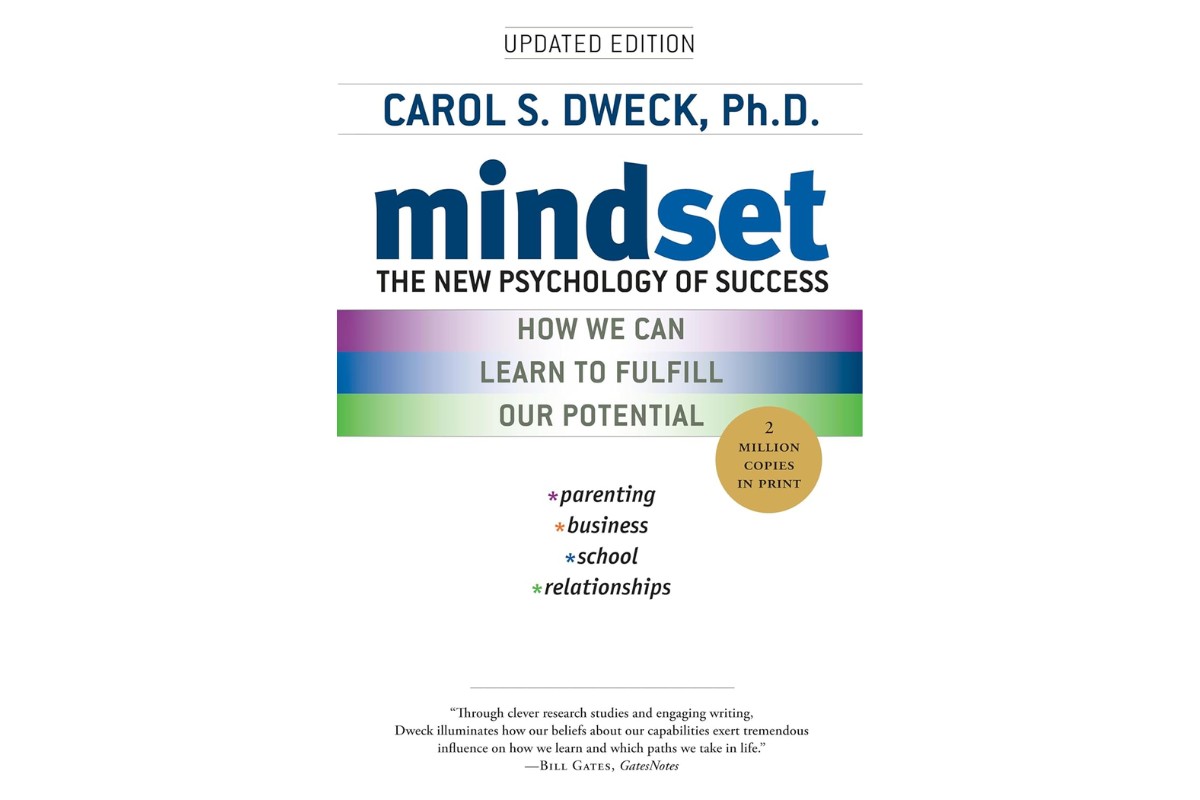
Mindset The New Psychology of Success Carol Dweck Review
In “Mindset: The New Psychology of Success,” psychologist Carol Dweck introduces readers to a groundbreaking concept that has revolutionized the way we understand achievement and personal growth. Dweck’s research explores the profound impact of mindset on success, revealing that our beliefs about our abilities can shape our behavior, performance, and, ultimately, our outcomes in life.
By reaching inside the contrasting ideologies of the growth mindset and fixed mindset, Dweck offers readers invaluable insights into how they can unlock their full potential and achieve their goals. Through real-life examples and practical strategies, “Mindset” challenges readers to reconsider their approach to challenges, setbacks, and learning, empowering them to cultivate a mindset that fosters resilience, determination, and lifelong success.

Table of Contents
Introduction to mindset.
Mindset refers to the collection of beliefs, attitudes, and assumptions that shape an individual’s perception of themselves and the world around them. It influences how people interpret events, approach challenges, and make decisions in their lives. An individual’s perspective can be either fixed or growth-oriented.
- A fixed mindset is characterized by the belief that abilities and talents are innate and unchangeable. Individuals with a fixed mindset may avoid challenges, give up easily in the face of setbacks, and view effort as fruitless.
- Conversely, a growth mindset is characterized by the belief that abilities can be developed through dedication, effort, and learning. Individuals with a growth mindset adopt challenges, survive obstacles, and see failures as prospects for growth.
The power of a growth mindset lies in its ability to foster resilience, determination, and a willingness to learn. Embracing challenges as opportunities for growth, individuals with a growth mindset are more likely to persevere in the face of obstacles and ultimately achieve success.
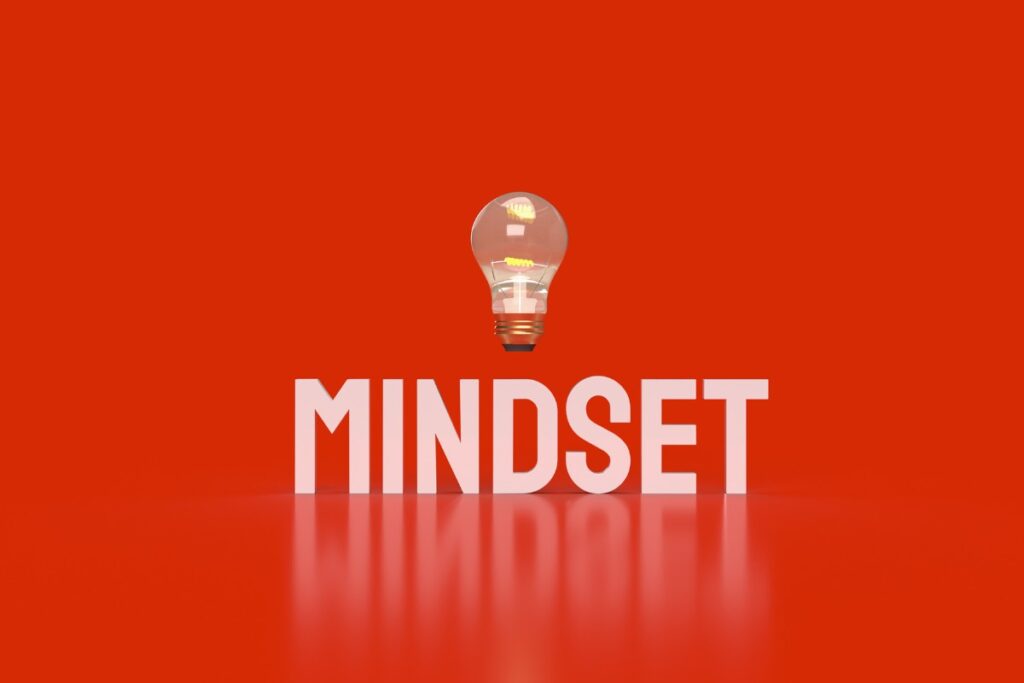
Carol Dweck and “Mindset: The New Psychology of Success”
Renowned psychologist Carol S. Dweck introduced the concept of mindset to the mainstream with her groundbreaking book, “ Mindset: The New Psychology of Success. ” In this seminal work, Dweck explores the implications of mindset on achievement and offers practical strategies for cultivating a growth mindset.
Mindset Book Carol Dweck
Mindset: The New Psychology of Success by Carol S. Dweck explores how beliefs about our abilities and potential can affect our performance and well-being in various domains of life, such as school, work, sports, relationships, and more.
Dweck distinguishes between two types of mindsets: fixed and growth.
Fixed Mindset
People with a fixed mindset believe that their talents and intelligence are innate and unchangeable. They tend to avoid challenges, give up easily, ignore feedback, and feel threatened by the success of others.
Growth Mindset
People with a growth mindset believe that their abilities can be developed through effort, learning, and perseverance. They tend to embrace challenges, persist in the face of setbacks, seek feedback, and celebrate the success of others.
Dweck argues that a growth mindset can lead to greater achievement, motivation, resilience, and happiness. She offers practical advice on cultivating one in oneself and others.
The book has received positive reviews from many readers, who praised Dweck’s research, insights, and examples. Some of the typical pieces that appeared from the reviews are:
The book is easy to read, engaging, and inspiring.
The book applies to various aspects of life, such as parenting, teaching, managing, coaching, and personal development.
The book challenges some of the conventional wisdom and myths about talent, intelligence, and success.
The book encourages readers to reflect on their mindsets and behaviors and to adopt a more growth-oriented attitude.
Some of the criticisms that the book received are:
The book is repetitive, simplistic, and overgeneralized.
The book does not address some of the limitations and nuances of the mindset theory, such as the role of genetics, environment, personality, and context.
The book does not provide enough evidence or examples to support some of the claims and recommendations.
Overall, Carol S. Dweck’s book Mindset: The New Psychology of Success seems to have had a positive impact on many readers, who found it helpful, informative, and empowering. However, some readers also expressed reservations, doubts, and questions about the validity and applicability of the mindset theory.
If you are interested in buying Carol S. Dweck’s book Mindset: The New Psychology of Success, click on the link below to order it from Amazon .
You can also read more customer reviews and ratings before purchasing. I hope you enjoy the book and learn something new from it. 😊
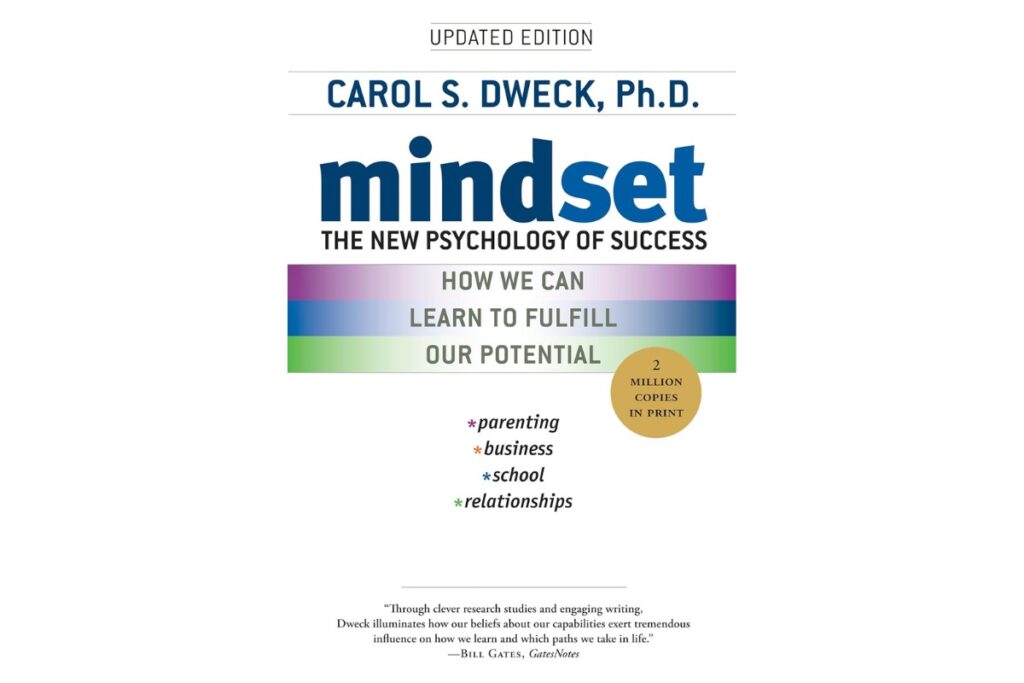
Applying a Growth Mindset in Daily Life
Applying a Growth Mindset in Daily Life involves adopting a mindset that emphasizes learning, development, and resilience in the face of challenges. It’s about cultivating a positive attitude towards personal growth and embracing opportunities for learning and improvement in various aspects of life.
In practical terms, applying a growth mindset means:
- Embracing Challenges : Viewing challenges as opportunities for growth rather than threats. Instead of avoiding difficult tasks, individuals with a growth mindset approach them with curiosity and determination.
- Persisting in the Face of Setbacks : Understanding that setbacks and failures are a natural part of the learning process. Rather than giving up when faced with obstacles, individuals with a growth mindset persevere and use setbacks as opportunities to learn and improve.
- Seeking Feedback and Learning Opportunities : Actively seek feedback from others and use it as constructive input for personal growth. Additionally, I am seeking out new experiences and learning opportunities to expand my knowledge and skills.
- Believing in Effort and Improvement : Recognizing that effort and dedication are essential for growth and improvement. Instead of believing that abilities are fixed, individuals with a growth mindset understand that skills can be developed over time through practice and perseverance.
- Maintaining a Positive Attitude : Cultivating an optimistic outlook on life, even in the face of challenges or setbacks. By focusing on possibilities and opportunities, individuals with a growth mindset can overcome obstacles and achieve their goals.
Overall, applying a growth mindset in daily life involves adopting a proactive and resilient approach to learning and development, with a focus on continuous improvement and personal growth.
Challenges in Adopting a Growth Mindset
Challenges in Adopting a Growth Mindset entail overcoming barriers and obstacles that may hinder individuals from fully embracing this empowering mindset. While adopting a growth mindset can lead to personal growth and success, it’s not always easy to make the shift from a fixed mindset to a growth-oriented one. Some common challenges include:
- Fear of Failure : Many individuals fear failure and perceive it as a reflection of their abilities or worth. This fear can prevent them from taking risks or stepping out of their comfort zones to pursue growth opportunities.
- Negative Self-Talk : Internal dialogue and self-limiting beliefs can undermine efforts to adopt a growth mindset. Negative thoughts such as “I’m not good enough” or “I’ll never succeed” can sabotage progress and hinder personal development.
- Resistance to Change : Change can be uncomfortable and unsettling for some individuals, leading to resistance or reluctance to embrace new perspectives or behaviors associated with a growth mindset.
- Fixed Mindset Conditioning : Years of conditioning and reinforcement of fixed mindset beliefs from childhood or societal influences can make it challenging to break free from ingrained patterns of thinking and behavior.
- Impatience for Results : Adopting a growth mindset requires patience, persistence, and a willingness to embrace gradual progress and setbacks as part of the learning process. Some individuals may become discouraged if they don’t see immediate results or quick fixes.
- Lack of Support : Without a supportive environment or encouragement from peers, family, or mentors, individuals may struggle to maintain motivation and confidence in their ability to develop a growth mindset.
Overcoming these challenges requires self-awareness, commitment, and intentional effort. Strategies such as practicing self-compassion, reframing failure as a learning opportunity, surrounding oneself with supportive individuals, and seeking professional guidance or resources can help individuals navigate the journey toward adopting a growth mindset and unlocking their full potential.
Criticism and Controversies Surrounding Mindset Theory
Criticism and Controversies Surrounding Mindset Theory involves debates and skepticism within the psychological community regarding the validity and application of mindset theory, particularly in the context of education and personal development. While mindset theory, popularized by Carol Dweck’s work, has garnered widespread acclaim for its potential to promote resilience and learning, it has also faced scrutiny and critique. Some common criticisms and controversies include:
- Overemphasis on Individual Responsibility : Critics argue that mindset theory places too much emphasis on individual effort and mindset, potentially overlooking systemic barriers to success, such as socioeconomic factors, institutional inequalities, and structural inequities.
- Simplification of Complex Psychological Phenomena : Some psychologists question the oversimplification of human behavior and motivation inherent in mindset theory, suggesting that it fails to capture the full complexity of psychological processes involved in learning, achievement, and behavior change.
- Limited Empirical Evidence : While some studies have provided support for the efficacy of mindset interventions, others have yielded mixed or inconclusive results. Critics argue that the empirical evidence supporting mindset theory may be limited or methodologically flawed, raising questions about its reliability and generalizability.
- Potential for Harmful Effects : Some concerns promoting a growth mindset indiscriminately may inadvertently lead to harmful outcomes, such as increased pressure to succeed, heightened anxiety, or feelings of inadequacy among individuals who struggle to adopt a growth-oriented mindset.
- Commercialization and Misapplication : The widespread popularity of mindset theory has led to its commercialization, with numerous books, workshops, and programs claiming to teach individuals how to develop a growth mindset. Critics caution against the potential for oversimplified or misapplied interpretations of mindset theory in educational and organizational settings.
- Debates Over Replication and Reproducibility : Some researchers have raised questions about the replicability of findings related to mindset theory, highlighting discrepancies between original studies and subsequent replication attempts. These debates underscore the need for rigorous research and scientific scrutiny in validating the claims of mindset theory.
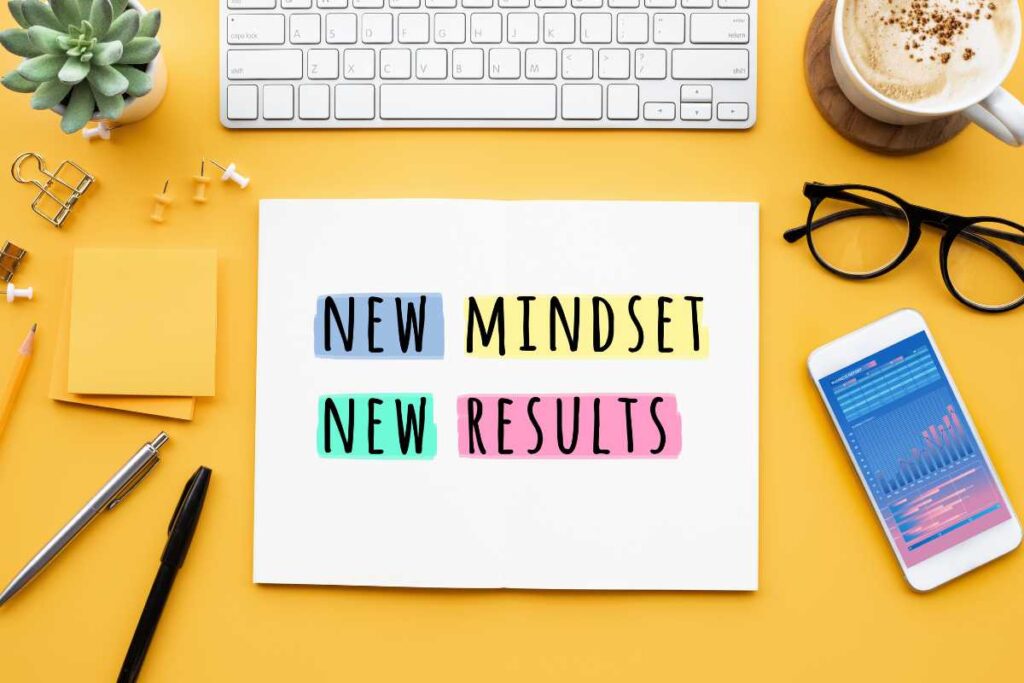
In conclusion, “Mindset: The New Psychology of Success” by Carol Dweck presents a compelling argument for the transformative power of mindset in shaping individual achievement and personal growth. Dweck’s exploration of the contrasting ideologies of fixed and growth mindsets offers readers valuable insights into how their beliefs about their abilities can influence their behavior and outcomes in life. Through real-life examples and practical strategies, the book challenges readers to reassess their approach to challenges, setbacks, and learning, empowering them to cultivate a mindset that fosters resilience, determination, and lifelong success.
Despite the book’s widespread acclaim and positive impact on many readers, it has also faced criticism and controversy within the psychological community. Critics have raised concerns about mindset theory’s oversimplification, the lack of empirical evidence supporting its efficacy, and the potential for harmful effects associated with its indiscriminate promotion. However, ongoing debates and discussions surrounding mindset theory highlight the importance of continued research and critical evaluation in understanding its implications for personal development and achievement.
Overall, “Mindset: The New Psychology of Success” remains a valuable resource for individuals seeking to unlock their full potential and achieve their goals. By embracing the principles of a growth mindset outlined in the book, readers can cultivate a positive and resilient outlook on life, overcome obstacles, and pursue success with confidence and determination.
What is the “Mindset: The New Psychology of Success” summary?
“Mindset: The New Psychology of Success” by Carol Dweck explores the concept of mindset and its impact on achievement and personal growth. Dweck introduces two types of mindsets: fixed mindset and growth mindset. Individuals with a fixed mindset believe that their abilities are innate and unchangeable, while those with a growth mindset believe that their abilities can be developed through effort and learning. The book emphasizes the importance of adopting a growth mindset to overcome challenges, persevere in the face of setbacks, and achieve success in various aspects of life.
Is the “Mindset” book worth reading?
Yes, “Mindset: The New Psychology of Success” is widely regarded as a valuable and insightful book. It offers practical strategies for cultivating a growth mindset and provides compelling examples of how mindset can influence behavior and outcomes. Readers interested in personal development, psychology, or achieving success may find the book highly beneficial.
What type of book is “Mindset”?
“Mindset” is a self-help book that combines psychological research with practical advice for personal growth and achievement. It explores the concept of mindset and offers strategies for developing a growth-oriented mindset to overcome challenges and achieve success.
How many pages is “Mindset”?
The page count of “Mindset: The New Psychology of Success” varies depending on the edition and publisher. The average length is around 300 pages.
Is “7 Mindsets” good?
“7 Mindsets” is a separate book or program from “Mindset: The New Psychology of Success” by Carol Dweck. The quality and effectiveness of “7 Mindsets” depend on individual preferences and needs. It’s recommended that you research reviews and testimonials to determine if they align with your goals and interests.
What are the four types of mindset?
The concept of mindset typically focuses on two main types: fixed mindset and growth mindset. However, some frameworks or models may classify mindsets into four categories: Fixed mindset: Belief that abilities are static and unchangeable. Growth mindset: Belief that capabilities can be acquired through action and learning. Open mindset: Embracing new experiences and perspectives with curiosity and flexibility. Closed mindset: Resisting change and clinging to familiar beliefs and habits.
If you want to read more articles similar to Mindset: The New Psychology of Success by Carol Dweck, we recommend that you enter our Psychology category.
Leave a Comment Cancel reply
You must be logged in to post a comment.

Review of "Mindset" by Carol S. Dweck
Intro to the review.
We have all had the experience of enthusiastically starting a new book only to realize that it is not what were expecting. The purpose of the following review is not to express my opinion on whether the book is "good" or "bad." I expect most of the books I read to be "good," Whether or not it is the right book for you is another question entirely. My goal for this and every review I write is to help you decide whether this book would be a good fit for you.
Here are some questions for you to consider:
Does it seem like the content covered in this book aligns with what I was expecting to find?
Is the main problem addressed in this book similar to my own goal for what I would like to get from reading it?
Is the style and format written in a way that will not hinder my ability to get the most value from this book?
Am I the intended audience for this book?
If after reading the review, you can answer yes to all these questions, there's a pretty good chance this book is the right fit for you. If not, well, there are plenty more books out there just waiting for you to read them.

The New Psychology of Success
Carol dweck, ph.d..
Ⓒ 2007 Baltimore Books
“Real self-confidence is not reflected in a title, an expensive suit, a fancy car, or a series of acquisitions. It is reflected in your mindset: your readiness to grow.”
Book review, author background.
Carol S. Dweck, Ph.D., is one of the world's leading researchers in developmental, social and personality psychology. She is a professor of Psychology at Stanford University.
All her publications can be found here . TED Talk: The power of believing that you can improve (2014)
What Problem Does This Book Attempt To Address?
Mindset is based upon the premise that there are two mindsets that people use to frame themselves and their lives. Dweck argues that one of these mindsets, the fixed mindset, holds people back and has many negative consequences on wellbeing and potential for growth for both children and adults. The purpose of the book is to lay out how each mindset differs and demonstrate the negative consequences of having a fixed mindset and the positive consequences of having a growth mindset. She also addresses how to help ourselves, children and employees obtain and maintain a growth mindset, especially when life gets challenging.
· Concept explanation: Clear
· Related stories: Many
· Data references and studies: Many
· Charts and graphics: One
· Practical application: Strong
The book starts by introducing the two mindsets and describing what it feels like to be a person in each mindset. The second chapter goes into great depth about the differences between the two mindsets in a wide range of situations. The following chapters delve into specific situations - work, relationships, parenting, etc. While the information can seem to be repeated from chapter to chapter, the purpose of repeating it in the context of people in different situations keeps it from feeling repetitive. The stories are used in a constructive manner to demonstrate different ways the mindsets can manifest both as thoughts and as actions. The last chapter is dedicated to helping readers make the shift from a fixed to a growth mindset for themselves.
Writing Style & Presentation
· Tone: Professional, but very readable
· Organization: Excellent
· Flow: Excellent
There is nothing I would have like to seen differently in regards to writing style or presentation. The breakdown of information into chapters based on context was ideal and the bullet points summarizing the main points from each chapter are very helpful.
Bringing It all Together
One thing done really well is the balance between stories of people with either the fixed or growth mindset, the results of studies, and the narration of the book. The other thing I thought was done really well was the addition of relevant information based on the section. It never felt like the same chapter repeated over and over with “teacher” swapped out for “boss”, for example. One main thing I took away from this book was that everyone has a fixed mindset, but in what situations and how often it shows up depends on the person.
Overall Recommendation
Who I would recommend this book for : Everyone, to be quite honest. I can’t think of a situation where this information wouldn’t be valuable to know either for yourself or for those you interact with on a regular basis.
If you enjoyed this book, Dweck also has another academic book titled “ Self-theories: Their Role in Motivation, Personality, and Development (Essays in Social Psychology) " which may be of interest to you as well.
Enhance Your Reading by Using a Workbook
If you have decided this book is a good fit for you, I have created a workbook to help you get the most value from reading it. Here is a small sample of the material contained in the workbook.
Your workbook includes:
Pre-reading questions
Chapter discussion questions with space for writing answers
Space to write your own summary for each chapter
Vocabulary words with space to write definitions and add words
Key terms with space to write definitions and add words
Chapter reflection questions
Final reflection questions
A condensed list of all discussion questions and vocabulary for reference
Reflection pages for writing thoughts and ideas
Discussion Question Preview
Below you will find a small sample of the discussion questions provided for every chapter of this book.

Key Terms Preview
CEO disease
Culture of development
Vocabulary List Preview
Effuse : (v.) To make a great or excessive display of enthusiasm
Histrionic: (adj.) Deliberately affected; overly dramatic or emotional
Mete: (v.) To give out by measure
. . . download the workbook for the full lists!
Where to Find the Workbook
All available workbooks can be found on Amazon and are free to Kindle Unlimited members.
You can find this particular workbook by clicking here.
Your Feedback is Appreciated!
Are you a student? A teacher? A manager? A parent? Why did you decide to use a workbook and did it help you get more from the book you were reading? Please share your experience so I can continue to make these workbooks a valuable resource to you and others.

I hope you enjoyed this post!
Sign up for our newsletter for updates on new releases.
If you like this post, please share it with someone you think would enjoy it too!!
- Self Improvement
Recent Posts
Review of "Adult Children of Emotionally Immature Parents" by Lindsay C. Gibson
Review of "Quiet" by Susan Cain
Review of "Love People, Use Things" by Joshua Fields Millburn & Ryan Nicodemus

Book review : « Mindset » by Carol Dweck
I still vividly remember the moment I stumbled upon Carol Dweck’s groundbreaking work, « Mindset. » As a seasoned writer and lifelong learner, I was immediately drawn to its promise of shedding light on the psychology of success and personal growth. Little did I know that this book would not only reshape my understanding of human potential but also profoundly impact the way I approach my craft.
Recommended Audience for « Mindset »:
Whether you’re an ambitious student striving for academic excellence, a dedicated professional seeking to break through self-imposed limitations, or a parent navigating the complexities of nurturing a growth-oriented mindset in your children, this book is an absolute must-read. Heck, I’d even recommend it to my fellow writers and creatives – after all, embracing a growth mindset can unlock new realms of artistic expression and storytelling prowess.
Overview of « Mindset »:
In her captivating narrative, Carol Dweck takes us on an insightful journey, unveiling the transformative power of adopting a growth mindset. Through compelling research and relatable anecdotes, she contrasts the limiting beliefs of a fixed mindset with the liberating embrace of a growth-oriented perspective. Prepare to have your preconceptions challenged and your mind expanded as Dweck deftly weaves together scientific insights and practical wisdom.
Author Background: Carol Dweck is not just a renowned psychologist and Stanford University professor; she’s a true pioneer in the field of motivation and personal development. With a writing style that seamlessly blends academic rigor and accessible storytelling, Dweck has a remarkable ability to translate complex psychological concepts into digestible nuggets of wisdom. Her passion for unlocking human potential shines through every page, inspiring readers to embark on their own transformative journeys.
Main Review of « Mindset »:
Plot and Pacing: From the opening chapters, Dweck hooks you with a compelling narrative that interweaves scientific findings and real-life examples. The pacing is masterful, allowing you to absorb the profound insights while remaining thoroughly engaged. Trust me; this is one book you won’t want to put down.
Characters: While « Mindset » isn’t a work of fiction, Dweck’s use of case studies and anecdotes breathes life into her concepts. You’ll find yourself resonating with the relatable characters, perhaps even recognizing aspects of yourself or loved ones in their experiences.
Writing Style: Dweck’s writing is a true delight – clear, insightful, and backed by rigorous research. Yet, she manages to infuse her prose with a warm, conversational tone that makes complex ideas feel like a friendly dialogue. As a writer, I can’t help but admire her ability to craft a narrative that is both intellectually stimulating and emotionally resonant.
An Overview of the Key Principles in « Mindset »:
Key Principles:
The key principle conveyed here is the growth mindset, as popularized by psychologist Carol Dweck. This perspective suggests that intelligence and talents are not fixed traits that we are inherently born with. Instead, they can be developed and improved over time through consistent effort, learning from feedback, and facing challenges with a positive attitude.
This concept challenges the traditional notion of intelligence or talent being static and highlights the importance of perseverance, resilience, and a willingness to step out of one’s comfort zone. It encourages individuals to view setbacks as opportunities for growth rather than indicators of innate limitations.
In essence, adopting a growth mindset can lead to a more fulfilling and successful life by fostering a belief in one’s ability to learn, adapt, and improve continuously.
Personal Reflection of « Mindset »
Alright, I’m gonna keep it real with you – « Mindset » was a transformative read that shifted my perspective on success and failure in a major way. As someone who’s struggled with self-doubt and the fear of falling short, Dweck’s insights resonated deeply, prompting me to embrace challenges with a growth-oriented mindset. It’s like she gave me the tools to rewrite the limiting narratives holding me back.
Critique & Comparison: Now, don’t get me wrong, while « Mindset » is packed with invaluable insights, some readers might find certain examples a bit repetitive or wish Dweck had gone even deeper into specific concepts. But what sets this bad boy apart is how it seamlessly blends scientific research with practical application – it’s like a one-two punch for personal growth, fam. Compared to other works in the genre, « Mindset » is a standout resource that’ll have you leveling up your mindset game in no time.
« Mindset » earns four stars for its transformative ideas, accessible writing style, and practical advice. It’s a must-read for anyone on a journey of personal and professional development.
Conclusion:
Look, at the end of the day, « Mindset » isn’t just another self-help book – it’s a game-changer that challenges the way we think about intelligence and success. Dweck’s insights have the power to rewire our mindsets and unlock our full potential, fam. If you’re looking to level up your personal growth game, this is a must-read.
But wait, there’s more! If you’re digging the mindset vibes, you gotta check out Angela Duckworth’s « Grit » and Daniel Coyle’s « The Talent Code. » These bad boys complement the themes in « Mindset » and will have you crushing it in all aspects of life.
Source : This review is based on a careful analysis of « Mindset » by Carol Dweck , combined with personal reflections and insights.
Amelia Grayson
Emilia Grayson is a skilled professional blogger whose love for literature takes center stage in her captivating book reviews and insightful analysis. With a genuine passion for reading, Emilia delves into the world of books with an expert eye, exploring the depths of plots, characters, and themes to provide readers with thought-provoking reviews. Through her eloquent writing and engaging style, Emilia's reviews transport her audience into the very essence of each literary masterpiece, offering a broad perspective that celebrates the diverse genres and authors she encounters. Her words spark curiosity, inspire bookworms, and leave readers eagerly awaiting their next literary adventure.
Cancel reply
Enregistrer mon nom, mon e-mail et mon site dans le navigateur pour mon prochain commentaire.
we think you'll like these

Book review : « Prequel » by Rachel Maddow
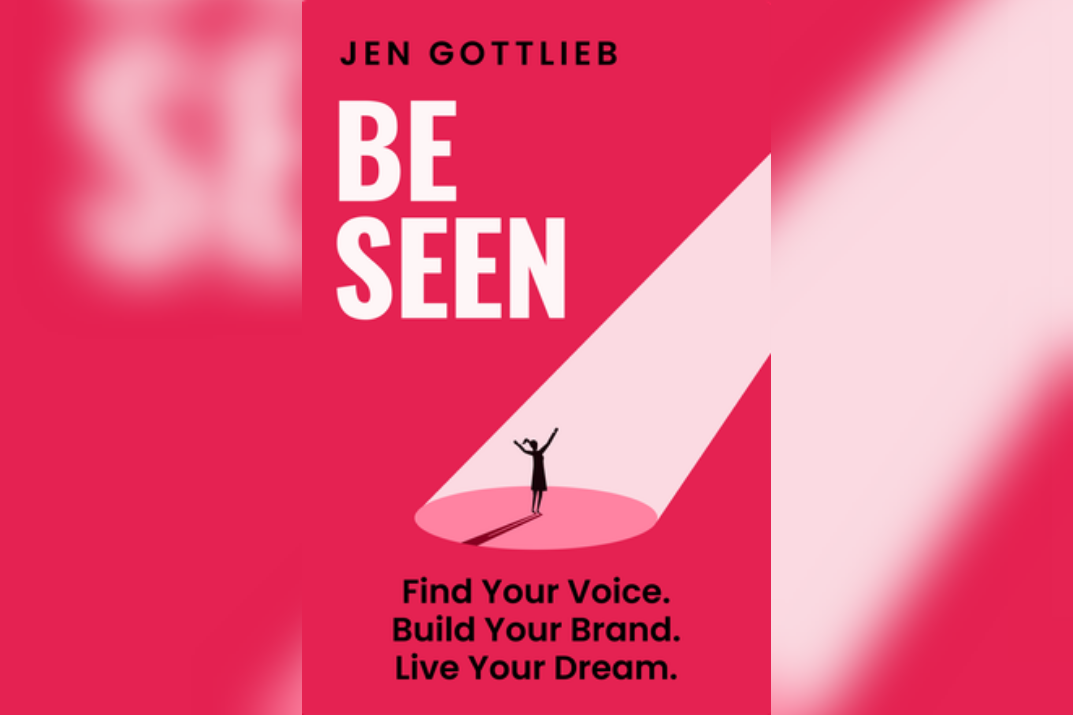
Book review : « Be Seen » by Jen Gottlieb
Book review : « The 80/20 Principle » by Richard Koch

Book review : « Rich Dad Poor Dad » by Robert T. Kiyosaki

Book review : « 7 Habits for Highly Effective Families » by Stephen R. Covey

Book review : « The Magic » by Rhonda Byrne.

A Thoughtful Review of « Manifest » by Roxie Nafousi : Unlocking Meaning

Book review : « Real Estate Investing For Dummies » by Eric Tyson

Book Review: « Red Helicopter » by James Rhee
Trending titles.

Book review : « Dare to Lead” by Brené Brown

Newest titles

The Power of the 5 AM Club: Unlocking Your Best Self

The Secret to Manifesting Your Dreams: the secret law of attraction book

The Mountain Is You review : Transforming Self-Sabotage Into Self-Mastery

A Review of Before the Coffee Gets Cold: Time Travel, Love, and Life’s Moments

A Review of Crying in H Mart: Grief, Identity, and Healing

Exploring the Lord of the Rings Books: A Journey Through Middle-earth

A Gripping Review of The Three-Body Problem by Cixin Liu

Demon Copperhead review: A Modern Tale of Resilience and Redemption

A Review of What Happened: Hillary Clinton’s Candid Reflection on the 2016 Election
- Career & Success 23
- Communication skills 3
- Motivation & Inspiration 19
- Personal development 36
- Management & Leadership 10
- Mindfulness & happiness 17
- Money & investments 9
- Technology & the Future 1
- Productivity 20
- Psychology 9
- Sex & Relationship. 4
- Society & Culture 9
- Marketing & Sales 1
Follow us on Instagram

Follow us on
Menu principal, quick links.
- Terms & conditions
- Privacy Policy
ABOUT GUIDE TO READS
- Book Reviews
Follow us on:

The Power of Meditation: Unlocking Inner Peace and Well-Being

Best Books to Cultivate a Clear Mind and Improve Your Thinking

Unlock the Secrets to Reading More Books in 2024

Best Life-Changing Books You Must Read Now

Best Personal Finance Books to Read in 2023


IMAGES
COMMENTS
Feb 22, 2021 · Book Review; Mindset by Carol Dweck. February 22, 2021 · In: Tools. Last Updated on August 27, 2024 by Thalia. By the end of last year, I was exhausted from reading ...
Jan 1, 2006 · In this book review, I will provide a summary of the key points in the book “Mindset: The psychology of success”. In addition, I will provide you with practical insights on how you can apply the concepts in the book and alter this self-limiting belief. So, let’s learn how to think like pros. The two mindsets and how they determine your future
Book Review (Personal Opinion): Carol S. Dweck’s book Mindset: The New Psychology of Success is about human thoughts and how they can influence how we live our daily lives. Written in the style of a self-help guide, this book is packed with useful tips and insights for improving your life.
growth mindset, failures are perceived as learning opportunities, chances to see what we don’t know yet or need to work on. Somewhat predictably, the fixed mindset leads to a fear of failure, and the growth mindset encourages risk-taking. This is obviously an important reason that the growth mindset is associated
Nov 12, 2023 · “Mindset: The New Psychology of Success” by Carol S. Dweck is a groundbreaking book that explores the concept of mindset and its impact on achievement, success, and personal development ...
Dec 7, 2015 · In the book’s final chapter, Dweck describes the workshop she and her colleagues have developed to shift students from a fixed to a growth mindset. These workshops demonstrate that “just learning about the growth mindset can cause a big shift in the way people think about themselves and their lives.”
Feb 21, 2021 · In this review I will give you: Overall review of Mindset by Carol Dweck and whether YOU should read it. Chapter-by-chapter summaries and actionable takeaways; Actionable steps that you can take right now to improve your mindset. Disclaimer: This post contains amazon affiliate links for the book Mindset by Carol Dweck. All purchases will go to ...
Feb 4, 2024 · Mindset Book Carol Dweck. Mindset: The New Psychology of Success by Carol S. Dweck explores how beliefs about our abilities and potential can affect our performance and well-being in various domains of life, such as school, work, sports, relationships, and more. Dweck distinguishes between two types of mindsets: fixed and growth. Fixed Mindset
Sep 29, 2023 · Intro to the ReviewWe have all had the experience of enthusiastically starting a new book only to realize that it is not what were expecting. The purpose of the following review is not to express my opinion on whether the book is "good" or "bad." I expect most of the books I read to be "good," Whether or not it is the right book for you is another question entirely. My goal for this and every ...
Main Review of « Mindset »: Plot and Pacing: From the opening chapters, Dweck hooks you with a compelling narrative that interweaves scientific findings and real-life examples. The pacing is masterful, allowing you to absorb the profound insights while remaining thoroughly engaged.